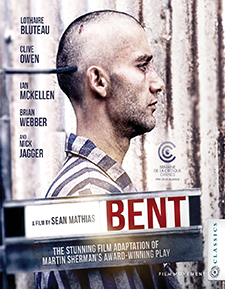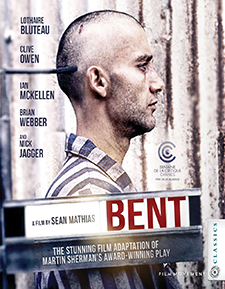Bent (1997) (Blu-ray Review)

Director
Sean MathiasRelease Date(s)
1997 (December 31, 2024)Studio(s)
Channel Four Films (Film Movement Classics/Vinegar Syndrome)- Film/Program Grade: A
- Video Grade: A
- Audio Grade: A
- Extras Grade: B+
Review
Movies about the Holocaust can be hard to watch, especially if they’re as devastating as Bent. Based on a play, the film deals with the persecution and brutality the German government inflicted on homosexuals not long before World War II. From his hedonistic life in 1934 Berlin, we follow the nightmarish journey of an openly gay man to his incarceration and dehumanization in a concentration camp.
Unable to get across the border to Amsterdam, Max (Clive Owen, Children of Men) and his lover Rudy (Brian Webber, Business Ethics) are hunted and captured by Nazi military men rounding up “undesirables,” such as homosexuals and Jews. Max is sent to Dachau, and believing the Nazis treat homosexuals worse than Jews, he pretends to be Jewish. On the harrowing train ride to the concentration camp, Max meets fellow prisoner Horst (Lothaire Bluteau, Don’t Look Up) and tries to make conversation, but Horst rebuffs him. Friendships can only lead to torture or even death.
At the camp, Max bribes a guard to have Horst assigned with him to the spirit-breaking task of carrying heavy rocks from one pile to another and back again. The two men, both gay, eventually form a bond and develop strategies to remain sane and survive the humiliations, tortures, and daily terrors of the concentration camp. As their spiritual bond deepens, they rely on mental role play because physical consummation of their affection for each other would mean instant death.
Director Sean Mathias doesn’t pull punches in Bent. He creates an atmosphere of constant terror as Max and Horst attempt to suppress their natural feelings to stay alive. The job they do is a metaphor for how useless their lives are to the Nazis, who don’t even deem them worthy of productive labor. Mathias sets up a visual contrast between the vibrant life of a gay community in relative freedom and the gray bleakness of the concentration camp. The early scenes feature a colorful orgy of song, dance, same-sex mingling, and cross-dressing. In this setting, apart from the mainstream, gay people can be themselves. They hurt no one and find camaraderie and companionship. Later, the stark walls and electrified barbed wire fencing of the concentration camp imprison not only the inmates’ bodies but their souls. Their mind-numbing “work” under unrelenting surveillance is designed to break the spirit and destroy hope. If violence is not a constant occurrence, it’s a constant threat.
Owen and Bluteau are both excellent as their characters conduct their secret love affair. With their shaved heads and baggy, striped prison uniforms, both actors look gaunt. Much of their performance relies on facial expression, as overt emotionalism would draw unwanted attention. In the cattle car transporting Horst, Max, and Rudy to Dachau, we see Owen’s Max restraining himself from defending Rudy as he sees the guards drag him to another car and hears the sounds of his savage beating. Huddled in a fetal position, Max tries to holds back tears, knowing that trying to help his lover would mean his own death.
Bluteau, whose Horst initially tries to discourage Max from even talking to him, later speaks from the heart. There’s a longing and desperation in his face and voice as he reveals his love, maybe his only remaining bit of humanity.
Ian McKellen (X-Men) portrays Max’s Uncle Freddie, a well-dressed, sophisticated, older gay man who tries to help Max escape Germany. In contrast to Max, Freddie has lived his life closeted and his conservative profile has kept him from being targeted.
The film’s production design is dazzling in the early scenes. Debauchery rules as open sex, drinking, and partying take on a surreal look. Mick Jagger (Ned Kelly) in full drag as Greta sings the sensual Streets of Berlin while slowly being lowered on a circular trapeze as dancers romp through routines worthy of Busby Berkeley. The exaggerated goings-on express openness and freedom, two things that will be taken away from this soon-to-be-persecuted community.
The film’s stage origins can be felt in the second half when dialogue dominates and, realistically, there’s little opportunity for visual variety. Part of this might be intentional. Director Mathias may want us to feel the tedium that Max and Horst experience every day. Fortunately, the performances are so riveting that suspense builds as we wonder what will become of these two men, guilty only because they’re branded as undesirables.
Bent was shot by director of photography Giorgos Arvanitis on 35mm film with Arriflex cameras and spherical lenses, finished photochemically, and presented in the aspect ratio of 1.85:1. The Blu-ray features an aspect ratio of 1.78:1 with excellent clarity and contrast. Color palette is quite broad, ranging from brilliant hues in the early gay club sequences to the bleak, gray tones of the concentration camp’s stone walls. The only bright color in the camp scenes is the red swastika insignia on the guards’ uniforms. Details such as stubble on Owen’s and Buteau’s heads and faces, their tattered garments, piles of rocks they must carry for no purpose day after day, stone dust that coats them from top to bottom, and festive accoutrements of Berlin’s gay social life are nicely delineated.
The soundtrack is English 2.0 stereo LPCM. English SDH subtitles are an available option. Dialogue is clear and distinct. Webber and Bureau speak with a slight accent. Owen and McKellen make no attempt at a German accent. The stereo separation is quite good, especially during a downpour when the rain sound emanates from both channels, providing the sense that you’re in the midst of it. Philip Glass’ spare score is appropriate for the subject matter and tends to be quietly reflective. Piano and violin solos are especially evocative and help create a mood of sadness and resignation.
Bonus materials on the Blu-ray release from Film Movement Classics include the following:
- Behind-the-Scenes Footage (11:35)
- Mick Jagger Streets of Berlin Music Video (2:43)
- Brian Webber Interview (1:42)
- Clive Owen Interview (1:52)
- Ian McKellen Interview (1:33)
- Lothaire Bluteau Interview (2:22)
- Martin Sherman Interview (1:41)
- Mick Jagger Interview (1:41)
- Sean Mathias Interview (2:14)
- 2018 Trailer (1:52)
- Original Theatrical Trailer (2:35)
- Edward II Trailer (1:32)
- Antonia’s Line Trailer (1:48)
- The Quiet Earth Trailer (1:00)
Behind-the-Scenes Footage – Various scenes are blocked and rehearsed by director Sean Mathias. In one elaborate set-up, track is laid with a crane mounted on a dolly to follow Max and Horst as they carry rocks back and forth in the concentration camp. Mick Jagger is heard on the soundtrack singing Streets of Berlin. There’s no narration.
Brian Webber Interview – The actor speaks about the persecution of minority groups prior to and during World War II. The plight of homosexuals of that era has been forgotten. The film shows the thriving social life and flavor of the gay clubs before the Nazis closed them.
Clive Owen Interview – The events shown in the film reflect the Night of the Long Knives, when the Nazis came down heavily on the gay community, making homosexuals fugitives in their own city. Owen prepared for the role of Max by losing weight, agreeing to have his head shaved, and reading about the Holocaust.
Ian McKellen Interview – McKellen discusses his role a gay man living as a straight man and unhappy at not being able to live his true life. McKellen introduced the role of Max when Bent premiered at the Royal Court Theatre in London in 1979. The film speaks on behalf of those who couldn’t speak out for themselves.
Lothaire Bluteau Interview – Bluteau says the film is about the journey of Max. Horst tells Max that if he survives the train, he has a chance. Bluteau’s job is to bring honesty to the role of Horst.
Martin Sherman Interview – Author Sherman speaks about the process of adapting his play into a film, noting the differences between the two media. In the story, “Berlin is on its way to being a concentration camp” because of the crackdown on homosexuals.
Mick Jagger Interview – Jagger reveals his doubts about his ability to sing Streets of Berlin, since it wasn’t his style. Eventually, the number was arranged so that it worked for Jagger. He enjoyed being made up as a woman but says he wouldn’t want to meet Greta in a dark alley at night.
Sean Mathias Interview – Director Mathias speaks about the collaborative nature of making a film. He thrives on the long hours, which he likens to being in a fantasy world. Even as it points to the little-known persecution of homosexuals in Nazi Germany, Bent is both a love story and a tale of friendship.
Booklet – The enclosed 16-page booklet contains a director’s statement by Sean Mathias, the essay Leveraging Suffering and Persecution in Bent by Steven Alan Carr, color photos from the film, a reproduction of the film’s poster art, cast and credits list, and a guide to related reading.
Bent isn’t for everyone. It’s a tough film to watch with its depiction of dehumanization. Rather than dealing with groups of people, the film focuses on just two men so that we get to know them and see, through their eyes, the horrors they endure. In terms of actual graphic violence, there isn’t that much, but what there is may induce some viewers to cover their eyes. This being said, Bent is extremely well made and well acted. There have been many movies about the persecution of Jews during the Holocaust. Bent reminds us that other marginalized groups, too, were at the mercy of the Nazis.
- Dennis Seuling

